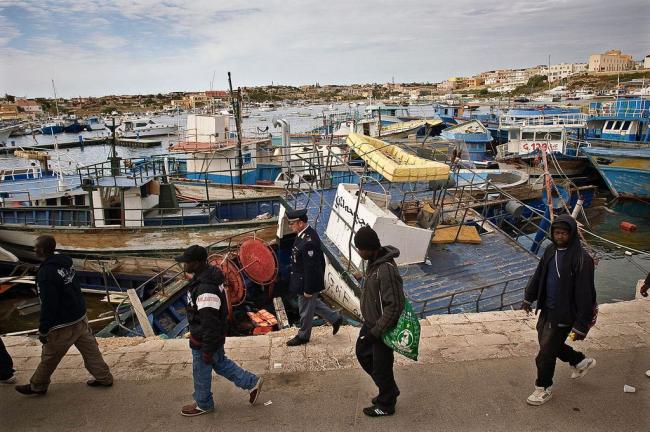
Europe should make 'mobility' central in migration policy, UN rights expert says
“The European Union (EU) must recognize that irregular migration is a result of policies prohibiting immigration,” the Special Rapporteur on the human rights of migrants, François Crépeau, addressing the UN Human Rights Council in Geneva. “Such policies only serve to open a new and lucrative market for smuggling rings, which could not exist without this prohibition.”
“If Europe insists on focusing most of its resources on securitization, it will fail to defeat smuggling rings,” Crépeau warned.
The Rapporteur called therefore on the EU to establish a human rights-based, coherent and comprehensive migration policy which makes mobility its central asset. “It is the only way in which it can reclaim its border, effectively combat smuggling and empower migrants,” the Special Rapporteur assured.
More than 200,000 migrants and asylum-seekers arrived in Europe by sea in 2014, compared with 80,000 in 2013, according to current estimates. So far this year, Europe has already received over 100,000 migrants and asylum-seekers who have arrived by boat. Some frontline states report daily arrivals.
“Migrants will come, no matter what,” Mr. Crépeau warned. “The EU will only be able to regain control of its borders if it banks on mobility, he insisted, noting that the overall goal would be to have most migrants using official channels to enter and stay in Europe.
“The EU must develop…create innovative regulated mobility options that will incentivize most migrants and asylum seekers to avoid having recourse to smugglers,” he noted. “Instead of forcing people into mechanisms that don’t respond to their needs, we need to understand the logic of their decisions and create policies that optimally match migrants’ skills and labour market’s needs.
Welcoming the new European Agenda on Migration, the Special Rapporteur noted that the figures for refugee resettlement are insufficient and the lack of open and regular channels for low skilled migrants coming to Europe is a huge oversight.
“The fact is that European member States rely on cheap migrant labour working in certain sectors within their economy,” he said. “They should recognize their real labour needs, including for low-wage work: to do otherwise would reduce them to being complicit with the exploitation of migrants,” he underscored.
The expert called on the EU to open up more regular migration channels and, at the same time, repress unscrupulous employers who exploit the fear of asylum-seekers and undocumented migrants to be detected, detained and deported. “Effectively implementing the employer sanction directive should be a priority,” he stressed.
“Combining such policies would lead to smaller underground labour markets, less irregular border crossings, less smuggling of migrants, less loss of life at borders, less labour exploitation, and less migrants’ rights violations,” Mr. Crépeau stated.
Independent experts or special rapporteurs are appointed by the Geneva-based Human Rights Council to examine and report back on a country situation or a specific human rights theme. The positions are honorary and the experts are not UN staff, nor are they paid for their work.
Photo: UNHCR/F. Noy
Support Our Journalism
We cannot do without you.. your contribution supports unbiased journalism
IBNS is not driven by any ism- not wokeism, not racism, not skewed secularism, not hyper right-wing or left liberal ideals, nor by any hardline religious beliefs or hyper nationalism. We want to serve you good old objective news, as they are. We do not judge or preach. We let people decide for themselves. We only try to present factual and well-sourced news.







